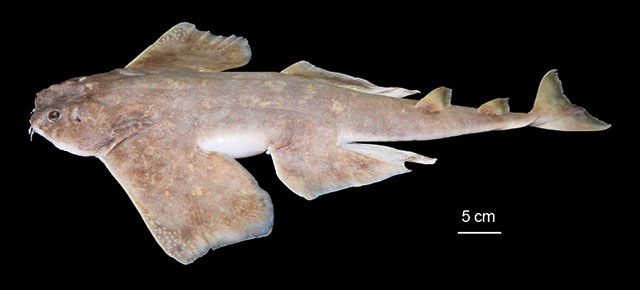| Squatinidae (Angel sharks) |
| 71.7 cm TL (male/unsexed); 87 cm TL (female) |
|
demersal; marine; depth range 100 - 500 m |
| Western Indian Ocean: Mascarene Plateau and India. |
|
This small angel shark (maximum size 870 mm TL) is distinguished by the following characters: absence of median row of scute-like denticles on trunk; anterior nasal flap with two lateral, elongate barbels and a medial rectangular barbel, all with ventral margins slightly fringed to almost smooth; concave between eyes; posterior nasal flap has an additional barblet; pectoral-pelvic space 10.0-14.9% TL; pectoral-fin apex angular; pelvic-fin free rear tips do not reach level of first dorsal-fin origin; tail is moderately long, its length from cloaca 50.2-58.5% TL; pectoral fins are moderately long, length 31.1-35.2% TL; dorsal fins are not lobe-like; first dorsal-fin base is somewhat longer than second dorsal-fin base; caudal fin of adults with angular apices; monospondylous centra 43-46; diplospondylous precaudal centra 55-58; total precaudal centra 100-104; total vertebral centra 130-136; pectoral-fin skeleton with propterygium articulating with four radials. Colouration: dorsal conspicuously bright, beige to light grayish-brown, with many light yellowish flecks on trunk, and pectoral and pelvic fins with countless densely set, minute dark spots, partially forming pseudocelli, all over the dorsal surface (Ref. 128961). |
| Reported size at birth is about 18.0-19.0 cm TL based on two late-term embryos; largest juvenile male with clearly immature claspers, is 37.3 cm TL (SAIAB 84178) and based on examined specimens, the maturity size of males is less than 64.5 cm TL. Largest adult (unretained) femal specimen is 87.0 cm TL; small paratypes at 26.3 and 37.0 cm TL are clearly juvenile (Ref. 128961). |
|
Not Evaluated (N.E.) Ref. (130435)
|
| harmless |
Source and more info: www.fishbase.org. For personal, classroom, and other internal use only. Not for publication.
